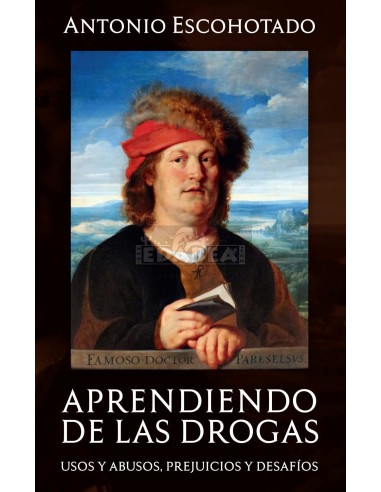Aprendiendo de las Drogas
Uses and abuses, prejudices and challenges
From the master Antonio Escohotado,for people who are curious or interested in the 'sensible' use of various types of psychoactive substances and plants.
It is a pleasant read; direct, agile and imaginative style. The information is quite reliable, as Escohotado does not talk about subjects he does not know directly.
Only available in Spanish.
Order it before 13:00 of today and receive it tomorrow with NACEX EXPRESS
Concise but complete manual of forms of use, knowledge and precautions on the use of various psychoactive substances. Classifying the plants and substances in three large groups (stimulants, drugs of peace and visionaries), for each card three sections are opened: brief historical note on the plant or substance; effects of the same in the mind and human body; and forms of use, as well as potentialities, of the same.
This book has become a small classic on more or less sensible ways of using psychoactive substances, following the author's postulate of situating drunkenness as one more branch of the fine arts: that is, how to take advantage, in an intelligent way, of what Nature and chemistry offer in terms of mood modification.
It also has a difference with respect to many other publications on the subject: it is written by a person who knows the effect of the great majority of the substances and plants it deals with, thus rectifying a defect that previous books and publications were suffering from: these consisted of an enumeration of the most nauseating effects that can occur in the sporadic or recalcitrant use of psychoactive substances (many of them illegal) that did not quite fit with what users of these substances possibly knew, and if we add to this the schematic, alarmist, scolding and soporific style of these publications and discourses, their effect and validity as a means of prevention was rather limited.
This manual was a turning point in a world divided between the good guys and the bad guys (between scarecrows and mystifiers).
Back cover:
Divine for some, diabolical for others, legal and illegal, drugs are not only the most peculiar "problem" of our time, but also a land of perplexities. Is it possible to learn something from them, or at least about them, instead of simply suffering their effects?
Offering the reader elements to construct his own answer, the author reviews almost a hundred compounds, including the main psychoactive substances of the past and present: crack, opium, alcoholic beverages, tranquilizers, LSD, heroin, ecstasy, cocaine, marijuana, coffee, sleeping pills and a long etcetera. Appeared in previous editions such as The Book of Poisons (1990) and For a Phenomenology of Drugs (1992), the present version has been thoroughly revised and updated with drugs discovered or subsequently disseminated.
"Escohotado is an empirical scientist, but he is also a popularizer, a philosopher, an adventurer and at times a poet. His book is indispensable. In addition to reliable information and numerous practical data, he provides the most accurate description that can be read about the effects of certain drugs: without fanfare, without mythification, without drama, without vanity, without alibis. The humor and light-hearted tone of the work do not limit but rather highlight its ethical tone" (J. Antón, El País).


